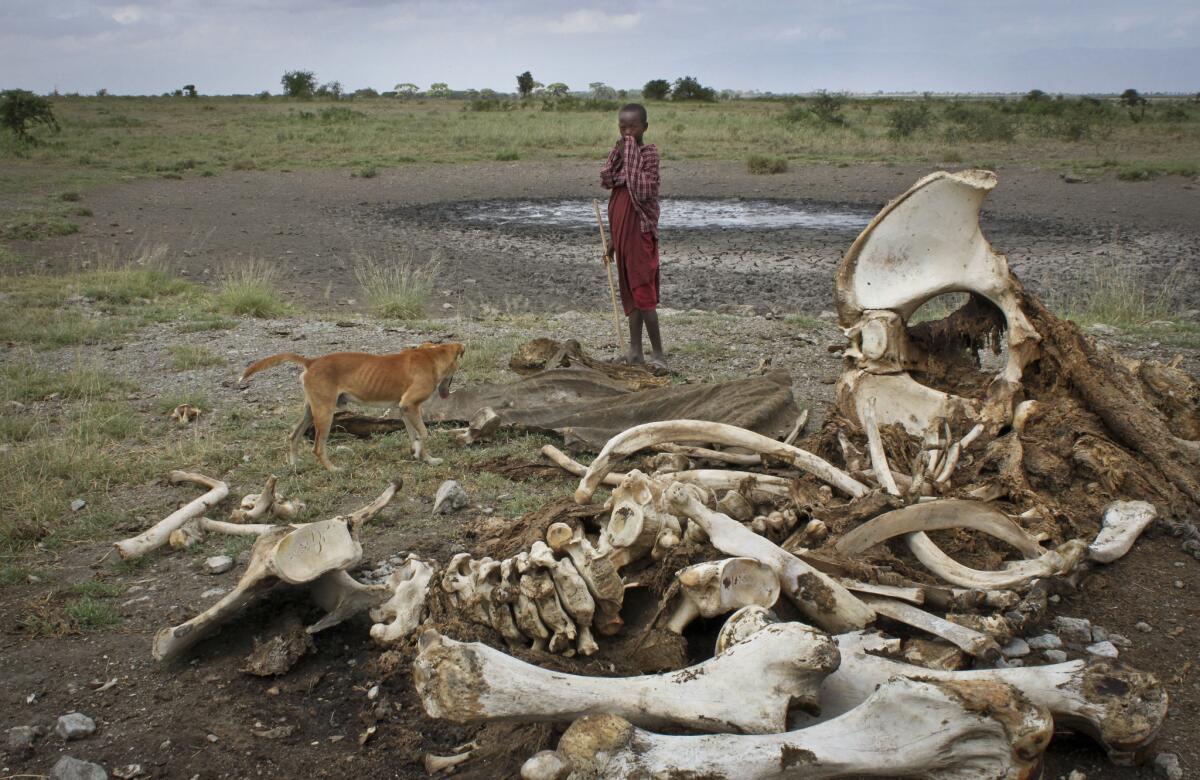Illegal ivory for sale in California has doubled in 8 years, study says

- Share via
An expert investigating illegal African ivory trafficking found that as much as 90% of the ivory he examined in Los Angeles markets and stores was illegal under state law. He found similar numbers in San Francisco and concluded that the proportion of illegal ivory for sale in California has doubled since his last study eight years ago.
The expert’s report, commissioned by the Natural Resources Defense Council, shines a harsh light on the illicit importation and sale of poached African ivory, a stubborn international problem. Despite high-profile public awareness campaigns and increased international enforcement, poaching and illegal ivory-trafficking are rising, with more than 100,000 elephants killed in the last three years, adding to the species’ catastrophic decline.
Conservationists are hoping that a new bill before the state Legislature will help staunch the flow of ivory. The proposed law, written by Assembly Speaker Toni Atkins, would more closely mirror federal law that bans all ivory imports, closing a loophole in current state regulations that allows for the sale of ivory brought into the state before 1977.
Specifically, the legislation would prohibit the purchase, sale and possession for sale of virtually all elephant ivory and rhinoceros horns. The proposed law — AB 96 — allows some exceptions for educational or scientific purposes or if the ivory is part of a musical instrument
Every 15 minutes an African elephant is killed for its tusks. Atkins affixed the number 96 to her bill because that is the number of elephants poached each day in Africa, an ever-growing figure that has landed elephants — the world’s largest land mammals — on international lists of endangered species.
Daniel Stiles, who wrote the report, investigated more than 100 vendors in Los Angeles and the Bay Area in March and April and examined more than 1,250 items. About 50% of the ivory for sale in California is illegal, Stiles estimated. The study concluded that as much as 90% of ivory for sale in L.A. was illegal under state law and as much as 60% was illegal under federal law.
The report speculated that consumers are confused about what ivory is illegal and which pieces, found in some antiques, for example, are allowed.
Stiles said consumers assume that if ivory is for sale in a store, it must be legal.
“Like potatoes, if they see items openly for sale, they assume it’s legal,” Stiles said. “Things should change once the new federal regulations are finalized and the new procedures are publicized.”
Federal law since 1989 has banned the sale of raw African ivory, but that regulation has also been stiffened and no longer allows the importation of antiques.
“We have a complete moratorium on any importation of African ivory,” said Craig Hoover, chief of the International Affairs Wildlife Trade and Conservation Branch of the U.S. Fish and Wildlife Service.
Federal enforcement emphasis has moved to ivory sellers, requiring them to demonstrate the legality of each item, Hoover said.
The Fish and Wildlife Service’s public awareness campaign repeats the maxim, “Only elephants should wear ivory.”
“We are making the connection between the death of an elephant and a piece of jewelry on the shelf,” Hoover said.
Conservationists hope the tougher state and federal statutes will also reduce the amount of illegal ivory making its way to California markets.
Stiles said that stepped-up enforcement is not the only answer.
“Reducing ivory demand is a longer-lasting, more effective way of controlling illegal imports,” he said. “No customers, no imports.”
Twitter: @julie_cart
More to Read
Sign up for Essential California
The most important California stories and recommendations in your inbox every morning.
You may occasionally receive promotional content from the Los Angeles Times.














